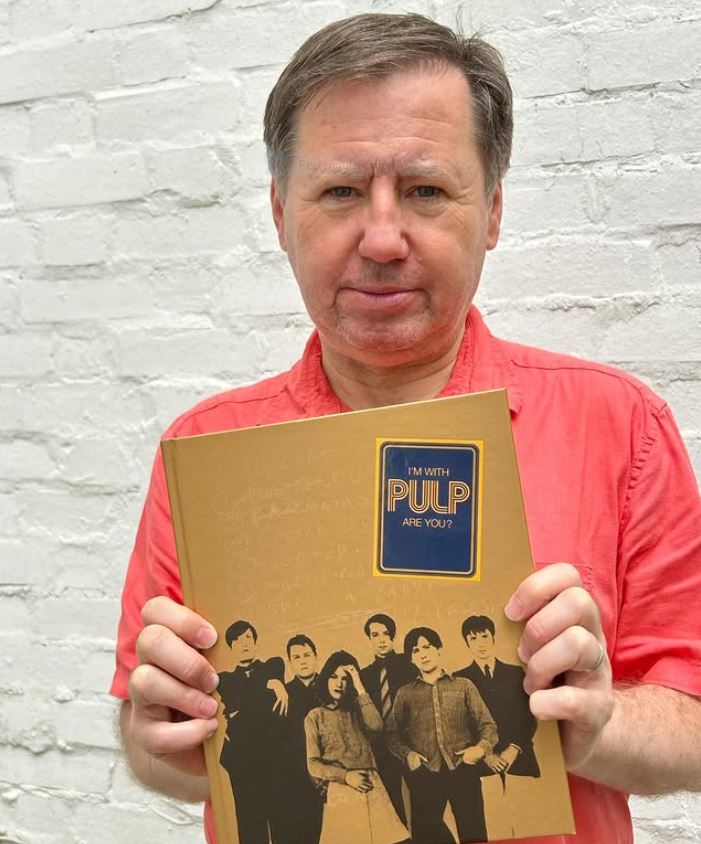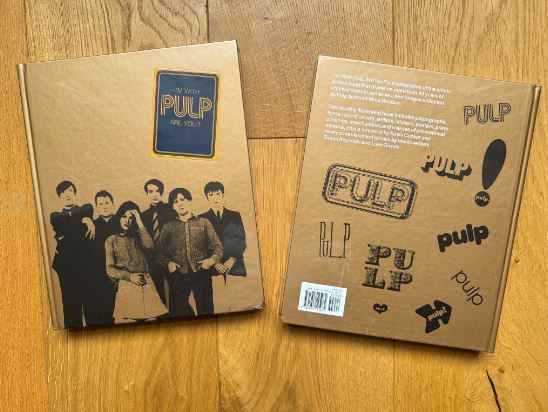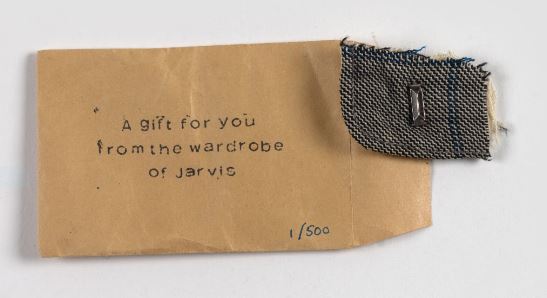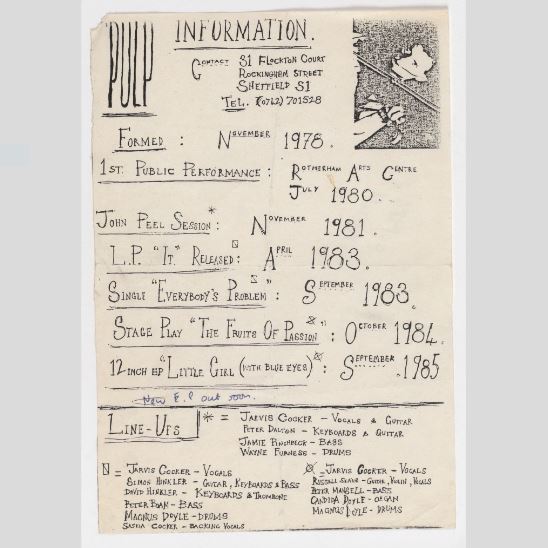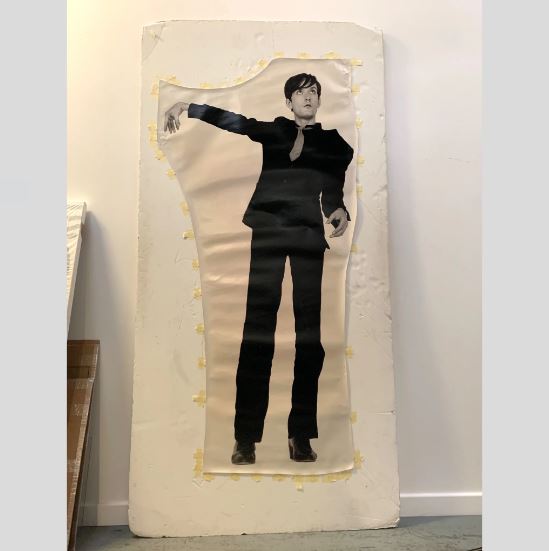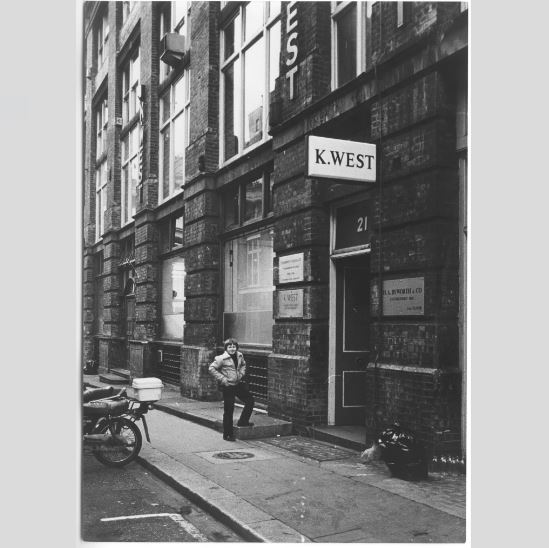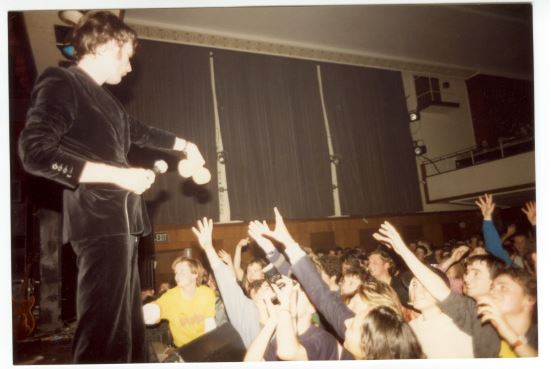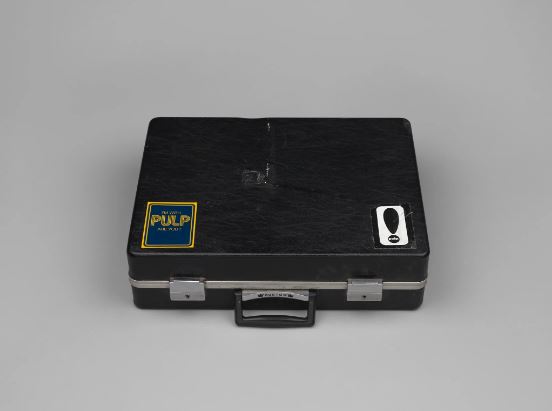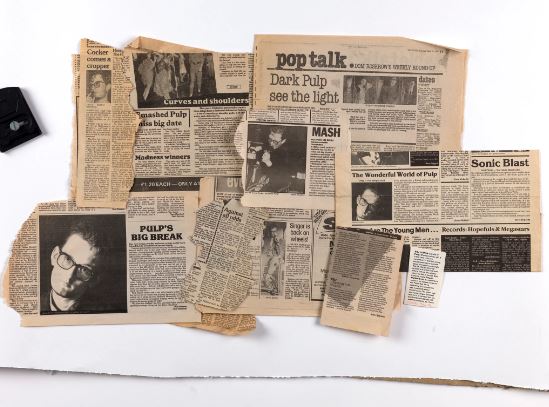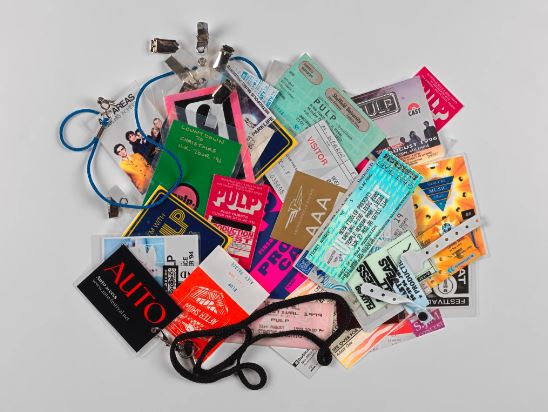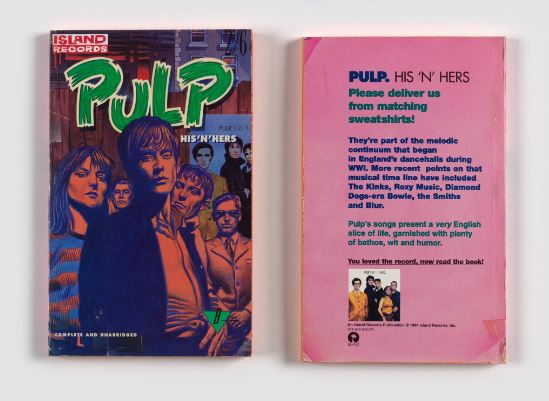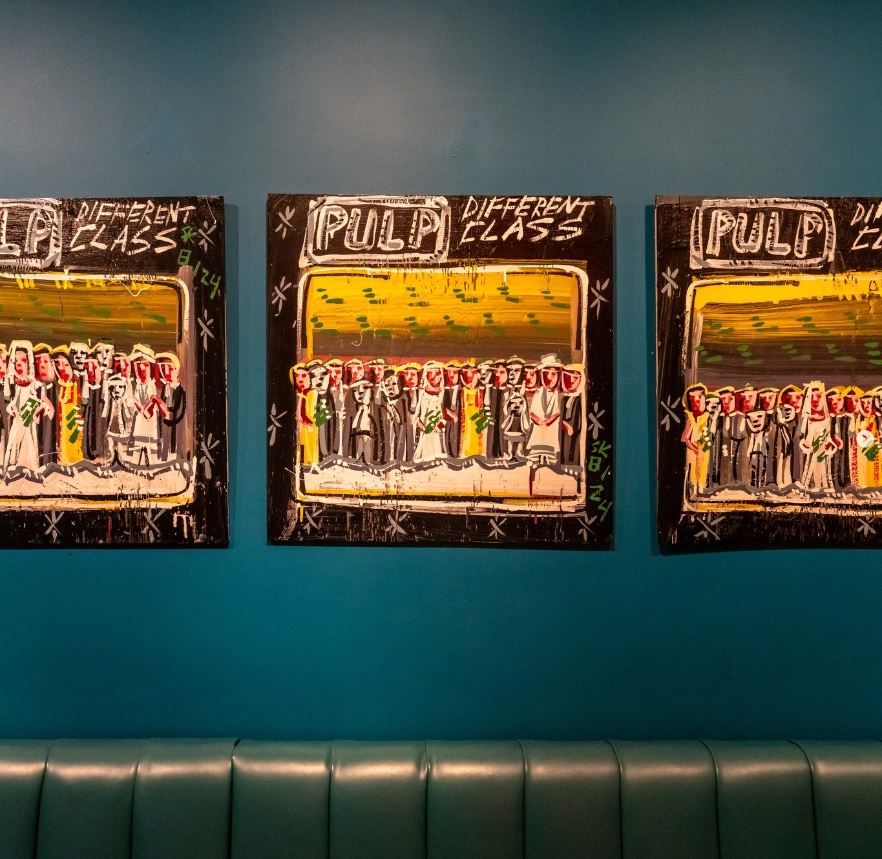I'm With Pulp Are You (book)
Details
Author: Mark Webber
Publication date: 3rd October 2024
Publisher: Hat & Beard Press
ISBN: 9781955125062 (hardback)
Formats: Hardcover, 288 pages
Publisher's synopsis
When Mark Webber discovered Pulp as a teenage music fan in 1985, the band was on first-name terms with most of their limited audience. Over the next few years, Mark began to help out with stage sets and light shows, eventually becoming the group’s first tour manager and running the fan club. After being called upon to play guitar and keyboards at live shows, he began to contribute to songwriting and recordings before being asked to join the band in 1995. This incredible backstory—from being a fan to joining his favorite band—provides the unique perspective of I’m With Pulp, Are You?
The book gathers material from Mark’s extensive collection of ephemera and objects accumulated over the last five decades of his involvement with the band. The lavishly illustrated pages combine images with Webber’s reminiscences to chronicle a history of the band told from the inside. It includes photographs, flyers, record covers, set lists, stickers, posters, press clippings, merchandise, and masses of promotional material. I'm With Pulp, Are You? also features a foreword by Jarvis Cocker, and newly commissioned essays by music writers Simon Reynolds and Luke Turner.
Notes
Foreword by Jarvis Cocker
Additional texts by Simon Reynolds and Luke Turner
Links
- Hat & Beard Press - hardback edition
- Super limited edition bundles containing “I’m With Pulp, Are You?”, “The Steve Keene Art Book” and Steven Keene painting based on the cover of "Different Class"
- Hat & Beard Press / Rough Trade Exclusive - signed by Mark Webber and postcard
- Mark's official 'gram
- The Archivist: Mark Webber of Pulp’s Baker’s Dozen via The Quietist
Pulp’s Mark Webber on his photo book and the band’s new songs: “It’s somewhere between mature and frothy pop music”
By Andrew Trendell | 28th November 2024 | Sourced from NME
The guitarist tells us about new "visual guide" 'I'm With Pulp – Are You', hanging out with Robbie Williams at the classic Glastonbury 1995, the chances of a new album and staying "glam, but on a budget
Pulp guitarist Mark Webber has spoken to NME about his new book I’m With Pulp – Are You? – as well as what the future may hold for the band.
Published back in September, the new book gathers Webber’s extensive collection of ephemera and objects. It was accumulated over 40 years with the band and presented as a visual history of Pulp as told through photos, flyers, record covers, setlists, badges, posters, press clippings, merchandise and more.
It comes with a foreword from frontman Jarvis Cocker, who describes Webber as a “hoarder” as well as the band’s “first fan” as well their “first tour manager” before he joined as a member in 1995.
“I don’t think I can claim to the first fan, but definitely one of the few in that period of the mid-to-late ‘80s,” Webber told NME. “There were not many people interested.”
Speaking about the band’s infamous wilderness period of their pre-fame period in the 1980s, Webber said: “I don’t think it was very romantic! Obviously I wasn’t in the group at the time, but I’m pretty sure they were frustrated that they’d already been doing it for quite a while and were not gaining much traction.
“The music they were making wasn’t as accessible as it became. They still had great ballads like ‘They Suffocate At Night’ and ‘I Want You’, but then this was juxtaposed with the more ‘spikey’ music like ‘The Will To Power’ and things like that. They were a band of extremes.”
Check out our full interview with Webber below, where he tells us about his highlights of the ’90s, that legendary Glastonbury, and if we’re due a new Pulp album.
NME: Hello Mark. What can you tell us about your earliest memories of Pulp?
Mark Webber: “I was young when I first met them; I was like 15. They’re only five or six years older than me, but at that age that’s like a massive difference. I was like a naive kid, and they seemed to be these sophisticated, arty, city-types. That was weird. There was a bit of a gulf between them and their audience.”
I’m With Pulp – Are You? That’s a strong title…
“It’s from a sticker that I made back in ’92 or ’93. That was based on a David Bowie sticker that I’d seen in an old documentary. It’s a sort-of challenge. I’m not showing off that I’m with Pulp. It’s a challenge to the reader: are you with us or against us? There was a period when Pulp did start to become popular and it felt like ‘us and them’. We will fight them on the beaches, and all that stuff!”
Was that outsider mentality much stronger for the band in the ’80s?
“I guess so, but I was so young and naive that I was kind of oblivious to it – even though I was one of those kids that would get picked on at school for being weird.”
Obviously Jarvis became the nerdy pin-up of the ‘90s, but what was he like in the ‘80s when he was still nerdy but not the pin-up?
“Now, he’s like a more sophisticated version of the same person. He hasn’t changed that much. It was weird because when I first started to get to know the band members, I didn’t really have that interaction with Jarvis. My contact was always through Russell [Senior, former guitarist]. There was always this idea in my fantasy of what bands were like where the singer would be this other sort of being!
“Once you get to know Jarvis, you realise he’s just a fella like the rest of us.”
When you flick through the pages of this book, you realise that Pulp have always had a certain aesthetic language. How would you describe what that is?
“I’m not sure if I could. It has changed such a lot over the years, even since the early ‘90s, but there were always people in the band that had graphic sensibilities and opinions about that side of things. It was always something that came out of the band rather than being imposed on it.”
Tell us about that early ’90s whirlwind when things started to really pick up for Pulp. What was it like to be in the orbit of the band with the infamous outsiders now threatening the inside of mainstream culture?
“It wasn’t threatening, it was exciting that people were finally taking notice. It was around the time of ‘My Legendary Girlfriend’ being released when the shift occurred. I wasn’t on the creative inside of the group at the time, so I’m not sure at what point they realised that there could be a ‘pop’ element to what Pulp did – but all of a sudden there were people coming to concerts with glittery make-up and feather boas. We embraced that.”
When putting the book together, did you notice that things got a little more polished and glam for the band visually around then?
“It was a bit glam, but on a budget! It was charity shop glam. Sometimes we’d do photoshoots and a stylist would show up with what they thought Pulp would want to wear, but invariably we’d end up our own clothes because people just didn’t get it; whatever that undefinable thing was.”
Jarvis refers to you as Pulp’s first fan and Pulp’s first tour manager. When did you start to get professionally involved?
“It was around 1991 that the group started to become a bit better organised and function a bit more seriously. Because I had shown some kind of entrepreneurial skills in organising concerts and making fanzines when I was a teenager when I was also carrying equipment around for them, either Russell or the band asked me if I would be the tour manager. What teenage fan would refuse that opportunity to hang around with your favourite band and carry their equipment up and down rickety wooden staircases all through the night?”
How were they to manage?
“It was like herding cats. Russell handled the business side of the band and he was very precise and organised, but generally it was quite hard to keep everyone together and to jump in the transit van at the right time. There was just no money around. We were either sleeping on floors on driving back through the night after playing concerts in Hull, Glasgow or London. It was terrible, but stuff you’re happy to do when you’re young.”
Is there anything from your briefcase that best captures these memories?
“There was my briefcase that I used when I was the tour manager. The more I think about it, the more it encapsulates this book and archive project. I knew I had this briefcase, but I hadn’t opened it up for years. When I started to go through all the boxes and opened the briefcase up, it still had concert contracts, business cards from bed and breakfasts, all my notebooks, all perfectly preserved and intact.”
A highlight of the book is the section of photos backstage from Glastonbury 1995, when Pulp headlined and you captured the likes of Robbie Williams, Oasis and Blur hanging out backstage.
“I don’t have much clear memory of it, other than the circumstances of our concert. I really hate music festivals, so that was my worst nightmare – but with the added complication of headlining the biggest music festival in the country. It was exciting. It was our first encounter with the likes of Robbie Williams, who was like a puppy who’d just been let out of the kennel, was just running around trying to get people to listen to his poetry. He’d bonded with Liam and Noel at the time.
“I don’t remember seeing the other bands, but I must have been there for at least two nights. The concert itself didn’t seem remarkable while it was happening. When you’re on stage, you’re too concerned with the task at hand – getting annoyed if the monitors are not right and stuff like that. I didn’t really soak up the situation as it was happening.”
Was there a sense of camaraderie among those bands when ‘Britpop’ became ‘a thing’?
“It didn’t feel like ‘a movement’. There was no co-ordinated action between the bands. In the early period, before the Blur vs Oasis thing got blown out of proportion, we would all see each other around a lot. Once you start to get your own success then you end up off in your own bubble.
“We did play loads of concerts with Blur in ’93 and ’94, as well as Lush and other people.”
We spoke to Pulp drummer Nick Banks last year, who told us that Britpop felt like somewhat of a “joke”. Would you agree with that?
“We were all pretty annoyed at the word and would try and avoid it. I used an asterisk in the book to avoid writing it, the same way Jarvis avoided writing ‘Margaret Thatcher’ in his [Good Pop, Bad Pop]. I understand the need for people to put things in categories like this. It helps in some way to define a certain area of activity, but not many of these groups had much in common.”
How was it riding that wave of success up until ‘This Is Hardcore’, which documented the dark side of Britpop and the bubble starting to burst?
“You know, I’m a bit boring. It would be hard to refuse the opportunity to go to film premieres and launch parties just out of curiosity, but the novelty soon wears off. I kept the same bunch of friends I had from before. I didn’t suddenly have a celebrity-filled Filofax or anything like that. I just didn’t get very excessive.
“Now I feel like maybe I missed out a little bit. Maybe other people were having a lot more fun than I was, but at least I survived to tell the tale.”
It’s better to be a witness of that than a casualty of it, right?
“Yes, and I guess I was always the wallflower; I was always on the edge of the party observing rather than participating. Maybe to my detriment.”
What was the mood like for Pulp at the turn of the century?
“There were two things happening at the same time: After ‘This Is Hardcore’, it was like a weight had been lifted. The music was a lot lighter and fresher. We wrote a lot of songs in that period. However, it was also like the group was grinding to a halt. I wrote in my book about how I checked out a little bit and lost interest in the band, but kind of hung on for not much longer until everyone else reached the same conclusion.
“We just slowly petered out after ‘We Love Life’ was released. There was no big falling out or big split announcement. We just came to a natural end, but still with a great record.”
And then how were the years 2002-2011 for you?
“I just completely got away from music. Around the ‘This Is Hardcore’ period I started to get involved in avant-garde cinema; organising screenings at museums and film festivals. There came a point where my commitments with the group became a bit inconvenient to that other work that I was enjoying.
“Once the group did stop, I just did that. I didn’t really listen to music, I didn’t have any instruments in the house, I just did other stuff and had to get away from it. Not because anything bad had happened; I’d just been doing it so long and things had become so intense that I’d just had enough of it.”
So what brought you back to the band for the first reunion in 2011?
“If I’d been asked sooner, maybe four years earlier, I don’t know if I’d have been that into the idea. Enough time had passed by the time the idea came around. I was curious. Once we did get together and play it was obvious that there was something undefinable there that was worth pursuing. That tour was so great.”
It’s nice that the book is so complete and takes us up to the present day…
“It’s interesting because when I was starting to work on the book, there was no inkling that the band would come back. I thought that 2011-2012 was the end of it and the period had been closed, then it came up again that we were possibly going to play – so I had to add this addendum at the end.
“Then we just carried on so I had to cut it off at the British tour next year. Who knows, maybe if there’s a second edition then there will be another chapter now?”
Pulp have been playing a lot of new songs on recent tours. How have they been going down?
“People seem to be excited at the fact that we have some new songs. If you play a new song, then it’ll take the audience a while to digest it – it’s not like they’ll be in ecstasy immediately. It’s been good, and it’s good for us to do something different. As great as the songs are, it can get boring playing the same thing again and again.”
How’s the chemistry within the band when writing so much new material for the first time in 23 years?
“It’s just natural. It’s just what we do. I don’t know. We just avoided it for a while. If anyone started to play something different then someone would tell them to stop! There’s a reluctance about opening the box without knowing what would come out. Now there are some songs and we’ve enjoyed playing them. I don’t know what will happen now.”
How would you describe the character and vibe of this body of work?
“I don’t know if we think of it as ‘a body of work’ yet because we haven’t done anything with it. We’ve not reflected on it, we’re just enjoying doing it. We’re older so it’s a bit more mature, but that makes it sound boring! It’s somewhere between mature and frothy pop music.”
You’ve some shows booked for next year and there are reports of Jarvis recording the new album in Walthamstow. What’s next for Pulp?
“I don’t know. We’ve got some shows confirmed, and I think it’s quite likely we’ll continue to do things.”
So you’ve nothing to say about a new Pulp album?
“Oh god no! I guess at some point we’ll have to decide if we’re going to do something with these songs. For the moment, that’s still hanging in the balance.”
What’s it like to be active a time like this, with Supergrass, Blur and Oasis all back on the scene and with a real hunger for music of that era?
“We’re 30 years now since that moment when those bands emerged. When I was growing up, 30 years ago was the birth of rock’n’roll! That’s hard to imagine. In the late ‘80s, I was obsessed with The Velvet Underground and David Bowie’s early records, so that’s normal. Music doesn’t just disappear – it hangs around and people discover.
“That was one of the things about the concerts in America: the audiences seemed generally very young and people that wouldn’t have seen us before.”
Pulp seem to remain an indie disco staple throughout the generations…
“I don’t go to indie discos! If it’s good music then it’s going to survive.”
I’m With Pulp – Are You? is out now and available to order here. Webber will be hosting a ‘This Is Hardcore’ listening session with journalist Pete Paphides at Spiritland King’s Cross in London on Sunday December 15, visit here for tickets and more information.
Pulp were this week announced to headline Tramlines 2025 for a huge homecoming show next July. Visit here for tickets and more information. The pre-sale for weekend and day tickets will begin at 6pm tonight (November 28) for those who are signed-up via the Tramlines website. The general sale of tickets is live at 12pm on November 29.
